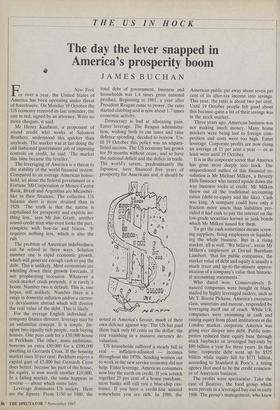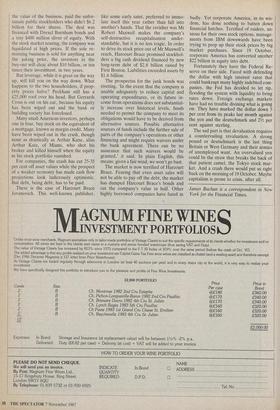THE US IN HOCK
The day the lever snapped in America's prosperity boom
JAMES BUCHAN
ForNew York over a year, the United States of America has been operating under threat of foreclosure. On Monday 19 October the US economy received its last reminder, the one in red, signed by an attorney. Write no more cheques, it said.
Mr Henry Kaufman, a proponent of sound credit who works at Salomon Brothers, understood this quicker than anybody. The market was at last doing the old-fashioned government job of imposing controls on credit, he said. 'The market this time became the leveller.'
The leveraging of America is a threat to the stability of the world financial system. Compared to an average American house- hold, let alone the federal government or a Fortune 500 Corporation or Money-Centre Bank, Brazil and Argentina are Micawber- like in their finances. The collective US balance sheet is more strained than in 1929. 'The truth is that the nation is capitalised for prosperity and expects no- thing less,' says Mr Jim Grant, another sound-credit man who even looks the part, complete with bow-tie and braces. 'It requires nothing less, which is also the rub.'
The problem of American indebtedness can be solved in three ways. Solution number one is rapid economic growth, which will generate enough cash to pay the debt. This is unlikely. Most economists are whittling down their growth forecasts, if not prophesying recession. Whatever a stock-market crash portends, it is rarely a boom. Number two is default. This is, one hopes, still unlikely. Number three is a surge in domestic inflation and/or a curren- cy devaluation abroad which will destroy the real value of the debt. This is likely.
For the average English individual or company finance director, leverage may be an unfamiliar concept. It is simple. Im- agine two equally rich people, each buying houses. One pays cash for a £50,000 house in Peckham. The other, more ambitious, borrows an extra £50,000 for a £100,000 dwelling in Gerrards Cross. If the housing market rises 10 per cent, Peckham enjoys a capital gain of £5,000 but Gerrards Cross does better, because his part of the house, his equity, is now worth another £10,000. In a falling market, the same happens in reverse — about which more later.
Leverage dominates US society. Here are the figures. From 1950 to 1980, the total debt of government, business and households was 1.4 times gross national product. Beginning in 1981, a year after President Reagan came to power, the ratio started climbing and is now about 1.7 times economic activity.
Democracy is bad at allocating pain. Enter leverage. The Reagan administra- tion, wishing both to cut taxes and raise defence spending, decided to borrow. Un- til 19 October this policy was an unpara- lleled success. The US economy has grown for 59 months without cease, and so have the national deficit and the deficit in trade. The world's savers, predominantly the Japanese, have financed five years of prosperity for Americans and, it should be noted in America's favour, much of their own defence against war. The US has paid them back only 60 cents on the dollar, the rest vanishing in a massive currency de- valuation.
US households suffered a steady fall in real — inflation-adjusted — incomes throughout the 1970s. Sending women out to work in the new service economy did not help. Enter leverage. American consumers now buy the earth on credit. If you scratch together 25 per cent of a house purchase, most banks will call you a blue-chip cus- tomer. If you have a credit-line unused somewhere you are rich. In 1980, the American public put away about seven per cent of its after-tax income into savings. This year, the ratio is about two per cent. Until 19 October people felt good about this because quite a bit of their savings was in the stock market.
Three years ago, American business was not making much money. Many home markets were being lost to foreign com- petition and costs were too high. Enter leverage. Corporate profits are now rising an average of 15 per cent a year — or at least were until 19 October.
It is in the corporate sector that America has gone most deeply into hock. The unquestioned author of this financial re- volution is Mr Michael Milken, a Beverly Hills financier who turned upside down the way business looks at credit. Mr Milken threw out all the traditional accounting ratios (debt-to-equity and the like). Cash was king. A company could have only a fraction more assets than liabilities pro- vided it had cash to pay the interest on the low-grade securities known as junk bonds which Mr Milken issued for them.
To get the cash sometimes means screw- ing suppliers, firing employees or liquidat- ing the whole business. But in a rising market, all is well. 'We believe', wrote Mr Milken's employers at Drexel Burnham Lambert, 'that for public companies, the market value of debt and equity is usually a much truer and up-to-the-minute approx- imation of a company's value than historic- al accounting statements.'
Who dared won. Conservatively fi- nanced companies were bought or black- mailed by highly leveraged raiders, such as Mr T. Boone Pickens. America's executive class, uncertain and morose, responded by leveraging itself out of reach. While UK companies were swimming in cash and raising equity from pliant institutions in the London market, corporate America was going ever deeper into debt. Public com- panies reduced their equity base through stock buybacks or leveraged buy-outs by $80 billion a year for three years. In that time, corporate debt went up by $525 billion while equity fell by $171 billion, according to Standard & Poor's, a rating agency that used to be the credit conscien- ce of American business.
The profits were spectacular. Take the case of Beatrice, the food group which went private in a leveraged buy-out in early 1986. The group's management, who knew the value of the business, paid the unfor- tunate public stockholders who didn't $6.2 billion for their shares. The deal was financed with Drexel Burnham bonds and a tiny $400 million sliver of equity. With the stock market soaring, the company was liquidated at high prices. If the sole re- maining business is sold for anything near the asking price, the investors in the buy-out will clear about $10 billion, or ten times their investment, in two years.
But leverage, while it is great on the way up, will kill you on the way down. What happens to the two householders, if prop- erty prices halve? Peckham still has a £25,000 roof over his head. But Gerrards Cross is out on his ear, because his equity has been wiped out and the bank or building society has foreclosed.
Many small American investors, perhaps one in four, buy stock on the equivalent of a mortgage, known as margin credit. Many have been wiped out in the crash, though none as drastically as Arthur Kane, alias Arthur Katz, of Miami, who shot his broker and killed himself when the equity in his stock portfolio vanished.
For companies, the crash has cut 25-35 per cent off asset values while the prospdct of a weaker economy has made cash flow projections look ludicrously optimistic. But debt, being debt, has to be paid.
There is the case of Harcourt Brace Jovanovich. This well-known publisher, like some early saint, preferred to immo- late itself this year rather than fall into another's hands. That the ravisher was Mr Robert Maxwell makes the company's self-destructive recapitalisation under- standable, but it is no less tragic. In order to drive its stock price out of Mr Maxwell's reach, Harcourt Brace promised stockhol- ders a big cash dividend financed by new long-term debt of $2.8 billion raised by First Boston. Liabilities exceeded assets by $1.6 billion.
The prospectus for the junk bonds was riveting. 'In the event that the company is unable adequately to reduce capital and operating expenditures, or its future in- come from operations does not substantial- ly increase over historical levels, funds needed to permit the company to meet its obligations would have to be derived from alternative sources. Possible alternative sources of funds include the further sale of parts of the company's operations or other financing and might require waivers under the bank agreement. There can be no assurance that such waivers would be granted,' it said. In plain English, this means: given a fair wind, we won't go bust.
The market is now terrified of Harcourt Brace. Fearing that even asset sales will not be able to pay off the debt, the market has dumped Harcourt Brace's bonds and cut the company's value in half. Other highly borrowed companies have fared as badly. Yet corporate America, in its wis- dom, has done nothing to batten down financial hatches. Terrified of raiders, an- xious for their own stock options, manage- ments from IBM downwards have been trying to prop up their stock prices by big market purchases. Since 19 October, corporate America has converted another $22 billion in equity into debt.
Fortunately they have the Federal Re- serve on their side. Faced with defending the dollar with high interest rates that could bankrupt many highly indebted com- panies, the Fed has decided to let rip, flooding the system with liquidity to bring rates down. Foreign exchange markets have had no trouble divining what is going on. They have marked the dollar down 5 per cent from its peaks last month against the yen and the deutschmark and 21/2 per cent against sterling.
The sad part is that devaluation requires a countervailing revaluation. A strong pound or deutschmark is the last thing Britain or West Germany and their armies of unemployed want. An overvalued yen could be the straw that breaks the back of that patient camel, the Tokyo stock mar- ket. And a crash there would put us right back on the morning of 19 October. Maybe capitalism is prone to crisis, after all.
James Buchan is a correspondent in New York for the Financial Times.



































































 Previous page
Previous page